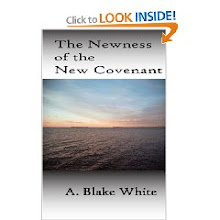
We want to return to our Sunday School series on today's blog post. It has been a while since I posted anything, so let me remind you that I have been outlining several arguments that can be used in favor of God's existence. Again, let me say from the outset several important things:
1) I consider myself a pastor and preacher, not a professional apologist. We owe great debt to those who commit their whole lives to the study of apologetics. That is their passion, their calling, their gifting. However, I think sometimes as Christians we try and make defending God's existence more difficult than it really is. Sure, there are always those really intellectual types who deny God's existence. They may or may not beleive that my arguments for God's existence are convincing. Nevertheless, at the end of the day I think we bring our own presuppositions to the table in discussing God's existence. I argue for His existence quite simply because the Spirit of God has regenerated my heart and mind, removing the veil, and thus revealing to me the glory of Jesus Christ. Those who argue against the viability of God's existence have yet to be met with the grace of God for salvation. Thus, in a sense, this type of individual will be limited in what they can even understand. They will not see that God exists until He chooses to open their hearts and minds to Him. Quite simply, sin darkens the mind. I could give the greatest oratory arguments for the existence of God and the really smart, thoughtful (and sinful) atheist will always find something to pick at me about. I make no qualms about this. This is reality. I do not think it is the end of the world if I do not argue like a professional apologist. I am quite satisfied in standing on the shoulders of great Christian apologists and trust they are smarter than me, have better arguments than I could ever construct, and have served the church well in the past, and I assume, will continue to do so. Christians must be careful to not view apologetics as if it were a game of chess. Arguments for God's existence should not be done for mere leisure and pleasure like a chess game. It is not a game of chess. Setting forth arguments for God's existence should always be conducted with an attitude that places Christ at the center. The goal is to reveal the glory of Christ not to merely prove a skeptic wrong, merely enjoy the debate game, or show an unbelieving skeptic how intellectually astute one is.
2) As I have stated in the past, the purpose of the Sunday school class is not to go into great detail on arguments for God's existence. The purpose of the class (at least when I planned it at the beginning) was to give an overview of basic Christian doctrine. I guess I have gone deeper into these arguments for God's existence than I wanted to. However, I think it is important to go slow (slower is better than faster) and make sure that I am clear, or as clear as a yet perfected saint can be.
3) I have been encouraged by many who tell me that they are learning new things. This is solely by the grace of God because I do not feel that I am an expert in this area! However, I have learned much in the past several weeks and am excited that the Spirit of God is teaching us together!
Okay, this is turning into a long blog post. Let me begin to develop the second argument that you can use with those who are skeptical regarding God's existence. The first argument was: "If a personal God does not exist, then how do we account for the cause and effect universe that we exist in?"
The second argument goes like this...
"If a personal God does not exist, then how do we explain the order, design, complexity, and harmony of the universe we exist in?"
Even some unbelieving scientists admit and readily affirm (in principle at least) that there is natural harmony, uniformity, design, regularity, etc. in an increasingly complex universe. In short, the world shows the mark of intelligent design. The world appears to be purposeful.
Fairly recently, scientists have adopted a principle that they call "the anthropic principle". Underlying this principle is the idea that the laws of nature appear to be designed particularly for human life to emerge. However, not all naturalists affirm this principle, and even if they do they are not ready to affirm the reality of the God of Scripture.
But let's assume for a moment that the typical naturalist is right. Let's assume with the majority of naturalists that the world we live in has its origins rooted in chance. Let's operate from their formula- nobody + nothing= everything. In other words, the universe was not designed by a Maker with particular purpose, meaning, and direction. Rather, it is simply time and chance acting upon matter.
Now if it is true that the universe is simply matter in motion according to chance, then everything we say and do (it follows logically) is also matter in motion according to chance- and nothing more. And this means quite simply that the atheist who argues against the existence of God in a debate hall actually does more to argue for the existence of God by opening his mouth. You say, okay buddy who's koolaid have you been drinking? Well, let me explain what I mean. Douglas Wilson has been extremely helpful in this area. If the universe is simply a series of chemical reactions (chance happenings if you will), and we are not the product of intelligent design- but just chemical reactions ourselves- then we have no reason to believe our own thoughts to be true or meaningful. And this means that we have no legitimate basis for asserting that our thoughts are even chemical reactions. In a world like this truth is not certain; it cannot be. Why would we trust logic if the world is just chaos- the product of chance?
Christian pastor and apologist Douglas Wilson gives a convincing illustration at the beginning of his debates with Christopher Hitchens. He says that it would not be that interesting if he shook up two bottles of carbonated beverages and placed them on the table at the front of a debate hall. Nobody, he argues, would think twice about sitting in a debate hall and watching those two bottles. Those bottles would not be debating. Rather, they would be fizzing over. They represent a simple chemical reaction and nothing more. Wilson then goes on to show that if we are just the product of chance, then we are simply chemical reactions.
Wilson's illustration should not be overlooked as elementary. It is profoundly foundational, but not superficially elementary. Wilson is taking Hitchens arguments away from him as illegitimate before he even has a chance to open his mouth to argue against the existence of God. Wilson is simply saying that it is foolish to trust logical thoughts, assertions, and communications of someone who denies the basic purpose and meaning of our universe. The atheist's argument collapses under the weight of a heavy presupposition which asserts that our world is the product of chance. And if so, then our thoughts are chance. And if that is so, then why trust them as meaningful. It would be equally as exciting to watch a coke bottle fizz over. Under the weight of their presupposition exist arguments that are reduced simply to chemical reactions; riots of matter ultimately meaningless, purposeless, and truly untrustworthy.
In other words, by the mere fact that the atheists is willing to trust logic and rationality proves that he believes deep down that there is some semblance of order, design, and purpose to this universe. Therefore, he does more to argue for God's existence even in the midst of blasphemous, God hating comments opposing God's existence! To God be the glory!
The atheist is really in a bind. On what basis should he be given a fair hearing? If he asserts that the world is chance, then his thoughts have to be viewed as chance too, right? So his position is flawed and inconsistent at the beginning because it does not logically allow for the asserting of any sort of objective truth. By the standards of his overall worldview, if the world is time and chance acting upon matter (and nothing more), then his thoughts are nothing more than that. Any assertion of truth on his part is just "chance". So why should we trust it as truth.
And this brings up obvious inconsistencies. Why does the atheist readily trust the laws of mathematics and logic. The atheist can say what he wants but as Douglas Wilson says we must "watch his feet" when he makes his statements. And when we look at his feet we will see him standing on the Christian's foundation. The Christian's foundation for logical argumentation is that we exist in a purposeful, meaningful world created by a purposeful, meaningful Maker. Thus, logical argumentation fits quite well with the Christian. It does not fit well with the atheist.
The Christian is consistent in depending upon laws of logic because laws of logic reveal purpose. And purpose points to a Maker behind the purposeful world that He created. On the other hand, it is inconsistent for the atheist to depend upon logic, and when he does he reveals that deep down he understands the purposeful world in which he exists. The Christian is consistent to use and recognize logic because he says God created those laws of logic- they flow from His character. Because God does not lie, the Christian understands that he too should not lie. Therefore, the Christian naturally attempts to follow laws of logic to tell others the truth regarding His existence. The atheist shows his inconsistency in following in principle the same laws of logic. He also cannot help but reveal that he too was created in the image of God. Laws of logic are innate to him as well. And it is the Christian's duty to lovingly show the atheist his inconsistencies in the hope that the Spirit of God would be pleased to open his heart and mind to truth.
Let me change gears and close with a convincing illustration in nature that reveals this order, design, complexity, and harmony of the universe we live in. We have been speaking about the order revealed through laws of logic. Now let's speak for a moment about order and purpose being revealed through laws of nature.
In his book entitled Exposing Darwinism's Weakest Link, Kenneth Poppe points out an interesting occurrence in Yellowstone Park. The timber wolf was re-introduced to Yellowstone several years ago. This caused the trout population in Yellowstone to immediately sky rocket. Now the question is, How and why would the re-introduction of the timber wolf into Yellowstone have anything to do with the trout population increasing?
The answer is related to the clear harmony, design, uniformity, and purpose of the world that we exist in. When the timber wolves were not present, the deer and elk would graze around the streams and drink water freely. In fact, they would do it all day. When the timber wolf was re-introduced this changed. The deer and elk went back to their normal pattern of eating and drinking. No longer could they graze and drink all day for fear of their predators. They would go to the streams early in the morning and late in the evening, quickly graze and sip some water before returning back to the woods for cover. With the timber wolf present, they were running the risk of being attacked. This caused the trout population to go up. This is how it worked: when the timber wolves were not present, the deer and elk ate an unnatural amount. They did this because there existed no fear of being attacked. They would walk around the streams all day kicking dirt into the water, which turned into mud. In addition, they had the time to consume whole saplings, thus removing would be shade from the streams. This impacted the trout population, which apparently does not like a muddy environment and unshaded waters. The activity of the deer and elk caused them to migrate away. However, when the timber wolves came back, the deer and elk were not around as much- saplings grew into large trees and the water was free from so much mud. The result: the trout came back and flourished!
The above illustration is just one of many that reveal the purpose and design of the universe. What the deer and elk did affected the trout. And what the timber wolf does (hunting deer and elk) affected the patterns of deer and elk. This is organized, purposeful, ordered creation being played out in the ecosystem. Surely, many more examples could be given. This is just one.
In short, it is self evident that our universe is purposeful. It has an end. It has direction. It possesses design, though it is complex. To affirm otherwise is to open oneself up to implications that deny one the ability (to logically) make such an assertion-such as "God does not exist"- viable and intelligent. This purposeful universe is the product of a Creator God.
Again, I would point out (as I did with the first argument) that this argument alone does not prove beyond doubt God's existence. It is simply one of many strands of rope, that when intertwined with other arguments, or strands of rope serve as one big rope which strengthens the overall argument for God's existence.
So the only meaningful answer to the question, "If a personal God does not exist, then how to we explain the order, design, complexity, and harmony of the universe we exist in?- is that there is not an adequate explanation. A personal, Creator God must exist.












.jpg)






